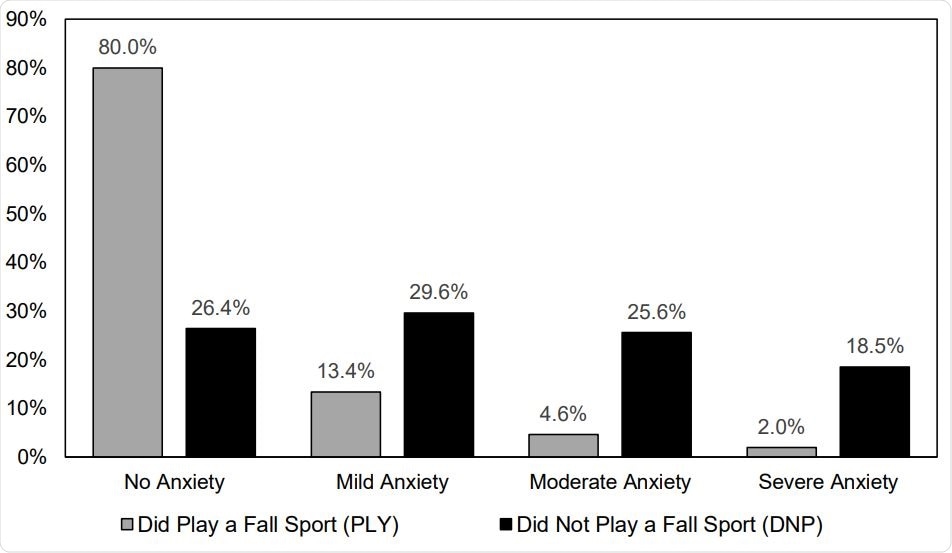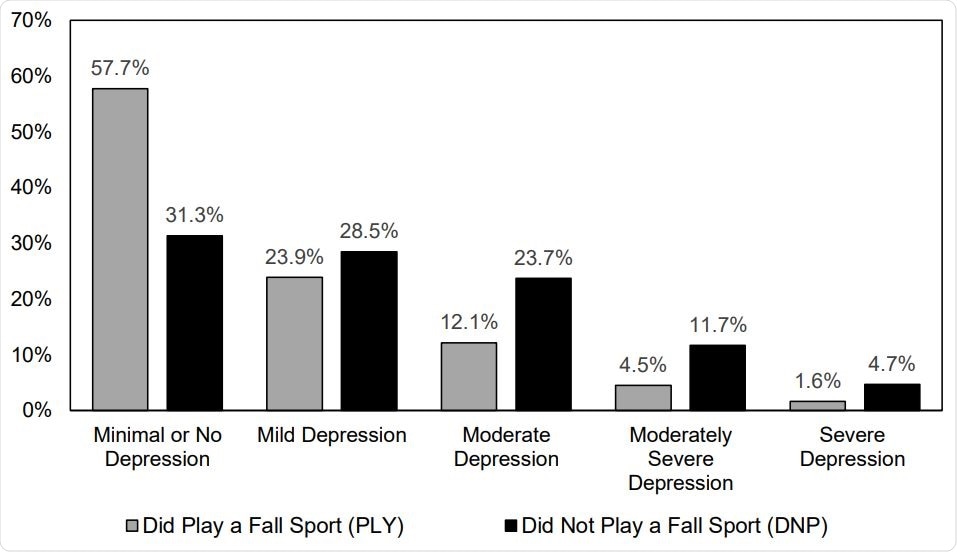School sports came to an abrupt halt during the COVID-19 (coronavirus disease 2019) pandemic. How this impacted adolescents' health, who were otherwise generally active in sports in their school, is examined in new research. What happened when adolescent athletes returned to organized sport in this pandemic?

 This news article was a review of a preliminary scientific report that had not undergone peer-review at the time of publication. Since its initial publication, the scientific report has now been peer reviewed and accepted for publication in a Scientific Journal. Links to the preliminary and peer-reviewed reports are available in the Sources section at the bottom of this article. View Sources
This news article was a review of a preliminary scientific report that had not undergone peer-review at the time of publication. Since its initial publication, the scientific report has now been peer reviewed and accepted for publication in a Scientific Journal. Links to the preliminary and peer-reviewed reports are available in the Sources section at the bottom of this article. View Sources
The study
A team led by Professor Tim McGuine, University of Wisconsin School of Medicine and Public Health, undertook a study to identify the impact of playing a sport during the COVID-19 pandemic on student athletes' health. The nature of the study was an online survey conducted in October 2020.
The findings could help inform public health experts, school administrators, sports medicine, and mental health providers regarding the potential physical and mental health benefits for adolescents when they participate in organized sports.
The researchers found that sports participation during the COVID-19 pandemic is associated with significant mental and physical health benefits in adolescents; those who returned to sport participation in fall 2020 reported lower anxiety and depression symptoms and higher physical activity levels. This work was performed at the University of Wisconsin-Madison, and the results are published on the preprint server medRxiv*.

Prevalence of Anxiety Symptoms for Adolescent Athletes Who Did or Did Not Play a High School Sport in the Fall 2020
The health benefits of physical activities, especially sport participation for adolescents, are well known. Every year an estimated 8.4 million US high school students participate in interscholastic athletics. However, the COVID mitigation strategies to arrest the transmission of severe acute respiratory syndrome coronavirus 2 (SARS-CoV-2) have negatively impacted active life. As part of the strategy, schools were closed, and high school sports were canceled.
Consequently, the mental and physical health of students was adversely affected. Most likely leading the youth to engage in passive activities and increase the prevalence of childhood obesity and the risk of cardiometabolic disease.

Prevalence of Depression Symptoms for Adolescent Athletes Who Did or Did Not Play a High School Sport in the Fall 2020
In this study, the researchers compared self-report data on anxiety, depression, physical activity, and health-related quality of life (HRQOL) for a cohort of athletes who played a sport with a similar cohort of athletes who did not play a sport in Wisconsin during fall 2020.
The study cohort included 559 Wisconsin high school athletes from grade 9–12, ranging from 13-19. Athletic trainers and coaches from 44 schools helped the students participate in the online survey. The questions involved the frequency of anxiety or depression symptoms, the measure of physical activity (assessed with the Hospital for Special Surgery Pediatric Functional Activity Brief Scale (PFABS) and about Health-Related Quality of Life (HRQoL; measured with Pediatric Quality of Life Inventory 4.0 (PedsQL).
Mental and physical health
The researchers claim that this is the first study to compare the mental health status, physical activity level, and HRQoL between high school athletes who were not able to participate in interscholastic sports during the CoVID-19 pandemic. Their findings are consistent with reports from experts and US Centers for Disease Control who have stated that COVID-19 will impact youth's mental and physical health.
"A limitation of the prior studies is the difficulty discerning if the health changes reported were primarily due to the restrictions on sport participation or the result of other factors such as sex, age, socioeconomic status or the lack of in-person school attendance."
Unlike previous reports, here they control for sex, age, and school instruction and the percentage of kids eligible for free or reduced lunch to help better define the impacts of sport participation during CoVID-19.
This study demonstrates that athletes who did not play interscholastic sports experienced significantly worse symptoms of anxiety and depression, lower levels of physical activity, and worse HRQoL compared to athletes who did not play sports in fall 2020.
This study covers the degree to which schools opted to host/sponsor sports, the nature of the sport organized by the school, the participation gender, and demographic information. The researchers also highlight this study's limitations, such as self-reporting, response bias, survey delivery method, the complexity of health and well-being, etc.
Quality of life scores
The researchers found that adolescent athletes who played a sport during the COVID-19 pandemic reported a higher quality of life scores compared to adolescent athletes who did not play a sport. This study established that high school sports participation may have significant physical and mental health benefits for US adolescent athletes during the CoVID-19 pandemic.
The researchers conclude that re-initiating sport participation may significantly improve mental and physical health for adolescents during the CoVID-19 pandemic. School sport participation is one of the most important factors for life-long physical activity and health. Continuing the sports for students as we go through the COVID-19 pandemic is complicated, requires consolidated efforts, but it is essential.
"Returning high school sport opportunities is a complex issue and requires careful consideration. Stakeholders should consider the promotion of physical activity for adolescents a top priority during the COVID-19 pandemic."

 This news article was a review of a preliminary scientific report that had not undergone peer-review at the time of publication. Since its initial publication, the scientific report has now been peer reviewed and accepted for publication in a Scientific Journal. Links to the preliminary and peer-reviewed reports are available in the Sources section at the bottom of this article. View Sources
This news article was a review of a preliminary scientific report that had not undergone peer-review at the time of publication. Since its initial publication, the scientific report has now been peer reviewed and accepted for publication in a Scientific Journal. Links to the preliminary and peer-reviewed reports are available in the Sources section at the bottom of this article. View Sources
Journal references:
- Preliminary scientific report.
High School Sports During the CoVID-19 Pandemic: The Impact of Sport Participation on the Health of Adolescents, Timothy McGuine, Kevin Biese, Allison Schwarz, Claudia Reardon, Scott Hetzel, M. Alison Brooks, David Bell, Andrew Watson, medRxiv 2021.02.07.21251314; doi: https://doi.org/10.1101/2021.02.07.21251314, https://www.medrxiv.org/content/10.1101/2021.02.07.21251314v1
- Peer reviewed and published scientific report.
McGuine, Timothy A., Kevin Biese, Scott J. Hetzel, Alison Schwarz, Stephanie Kliethermes, Claudia L. Reardon, David R. Bell, M. Alison Brooks, and Andrew M. Watson MD. 2021. “High School Sports during the CoVID-19 Pandemic: The Impact of Sport Participation on the Health of Adolescents.” Journal of Athletic Training 57 (1). https://doi.org/10.4085/1062-6050-0121.21. https://meridian.allenpress.com/jat/article/57/1/51/465818/High-School-Sports-During-the-COVID-19-Pandemic.
Article Revisions
- Apr 4 2023 - The preprint preliminary research paper that this article was based upon was accepted for publication in a peer-reviewed Scientific Journal. This article was edited accordingly to include a link to the final peer-reviewed paper, now shown in the sources section.